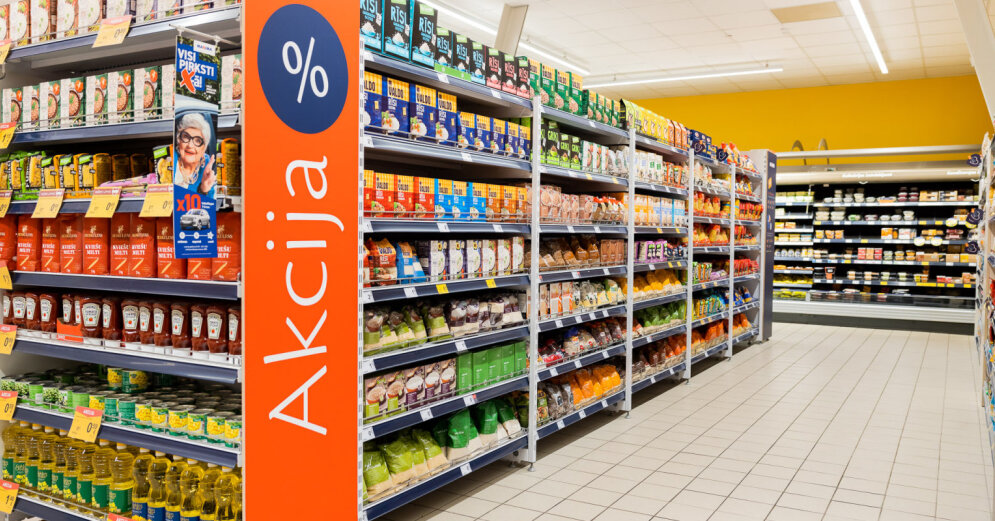A change in buyers ‘habits may affect the decline in manufacturers’ supply, Thursday retailer Ltd. “Maxima Edvīns Lakstīgala, Director of Management and Procurement of Merchant Categories, said at the presentation of the “latest” Maxima Retail Compass “research in Latvia.
–
–
Content will continue after the ad
Advertising
–
Lakstīgala pointed out that the turbulence that began in 2019 affected many industries, including retail, and that the shopping basket of the population has increased in recent years, but the volume of shopping has decreased, resulting in a general decrease in the volume of purchases of goods. The volume of impulse purchases, such as sweets, has also declined in recent years.
Buyers have a clearer definition of their claims against manufacturers, retailers, and cooperation between all market participants is essential. At the same time, producers must be willing to adapt to consumer habits affected by rising prices, and Bank of Latvia economist Kārlis Vilerts pointed out at the event that the increase in prices for a part of the society will be very painful.
On the other hand, in order for both retailers and producers to avoid losses, Lakstīgala said that there was a need for interaction and that producers might have to give up loss-making products while maintaining the same sales volume with fewer products. Also, given the lower frequency of shopping by the population and the shift to more frequent online shopping, the offer of large packages to shoppers should be considered.
Lakstīgala also pointed out that the number of assortment units in Maxima stores is being reviewed, leaving the necessary goods, at the same time Maxima is working with the company’s partners to obtain more citizen-friendly prices.
Lakstīgala also said that along with rising prices and changing shopping habits, state support for producers, especially producers of fresh products, including milk and bread, is important. “The best time for the government to come forward with support was yesterday,” so as not to suffer producers who could go bankrupt without state support, which will hurt consumers as competition from specific food producers decreases.
At the same time, Gustavs Zatlers, Director of Sales and Marketing at JSC “Cēsu alus”, pointed out at the event that supply chains can cause problems for producers, as the supply of raw materials, including grain, as well as the price of raw materials may be delayed.
He mentioned that in response to certain fluctuations in supply prices, prices are likely to change frequently and that both price increases and decreases will be observed.
Willert also confirmed the disruption of supply chains, including gas, fertilizers and metals will affect price increases.
According to a survey by Maxima Retail Compass, people now shop around as often as they did during a pandemic.
During the pre-pandemic in 2019, 74.3% indicated that shopping as often as before, in 2021 the number of people who did not change their shopping habits had decreased to 64.7%, while in 2022 they were 65.9% of respondents. .
In turn, in 2022, compared to 2019, the number of people who shop less often has increased – in 2019, 18.4% of respondents bought less, but in 2022, 29.8% of the population indicated that they shop less often than in previous years.
When asked about the reasons for less frequent shopping, 59% of respondents indicated that it is possible to save money, 45% shop less often to protect themselves from illness, 40% did not need to visit stores often, and 16% encouraged less shopping online. use of.
At the same time, 19% of respondents have visited stores less often due to trade restrictions, 11% have experienced changes in employment and mobility, 10% of the population has reduced the frequency of shopping for people without a Covid-19 vaccination certificate, and 2% have visited stores less for various entertainment services, e.g. due to cinema restrictions.
The survey also found that during the last six months, 23% of the respondents have visited the store every day, 46% of the respondents visit the store several times a week, and 24% – about once a week. At the same time, 3% visit the store a few times a month, and 1% about once a month. In turn, 1% buy food only in online stores, and 0.4% visit the store less than once a month.
At the same time, the survey asked how the population’s habits had changed as a result of the spread of Covid-19, and if in March 2020 16% of the population had started buying additional products with longer shelf life, including groats, canned food and oil, it fell to 13% in September 2020. %. However, in April 2022, the figure rose to 26%, due to Russia the impact of the war in Ukraine and the growing confusion among the population.
The survey also revealed that the popularity of online stores among the population has grown in recent years, if in March 2020 only 4% of respondents bought online, then in April 2022 20% or every fifth inhabitant is popular with online stores.
The survey also revealed the savings habits of the population. It is observed that the number of residents who do not make savings at all is decreasing – in 2019, 42% of respondents did not make savings, while in March 2022, 37% did not make savings. The increase in provisioning is due to increasing uncertainty.
When asked for what purposes provisions are made, in April 2022 62% indicated that they were made to cover unforeseen expenses, while in 2019 58% provided such an answer. The number of people who make savings for a non-white day has also increased, because it is not clear about the future economic situation – in 2022, 53% of respondents will save for this purpose, but in 2019, it was 42%.
At the same time, fewer and fewer people are saving for retirement and old age – this year 22% of respondents have indicated that they are saving for this purpose, but in 2019 they were 27%.
The majority of the population admits to changing their habits in recent years and only 23% of respondents have adhered to the current shopping habits in the last 12 months, for example, in April 2022, 22.2% of the population indicated that they buy mostly Latvian-made food, which is 5, 6 percentage points less than in the 2019 survey, and 17.1% of the population choose healthier products when shopping, which is 9.3 percentage points less than in 2019. In turn, 19.3% of the population like to use technological solutions, applications and scanners, self-service cash registers, which is one percentage point more than in 2019.
The survey was conducted in cooperation with the Research Center “SKDS“in April of this year, surveying more than 1,000 Latvian residents aged 18 to 74.
It has already been reported that the turnover of “Maxima Latvija” in 2021 was 915.225 million euros, which is 4.2% more than a year earlier, but the company’s profit increased by 1.9% and was 31.887 million euros.
The company “Maxima Latvija” was registered in November 2000 and its share capital is 4.91 million euros. “Maxima Latvija” is owned by the companies “Maxima grupe” and “Maxima LT” registered in Lithuania
–


